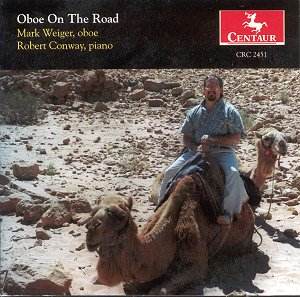The Sommergesang of Uruguay-born and
US-domiciled Aguila fooled me at first into expecting 13 minutes
of pastoral musing nodding to Rhapsody in Blue and Alan Hovhaness.
I also jumped to the conclusion that here was a vehicle for lyrical
oboe display. While there are some elements of truth in these way-markers
the piano plays a far from subsidiary role and the mood floats from
idyll to violence. The notes speak of Aguila's concern with the sometimes
devastating displays of mother nature. In the Sibbing piece you
get what the titles suggest: a sloe-eyed jazzy swerve of a Ballad,
a languid Blues and a tumbling Rag. Malcolm Arnold devotees
with a Joplin sweet tooth need look no further. Gompper's Anon
is grittier stuff employing some dissonance especially in the piano
part. Angell, founder of the Birmingham Art Music Alliance penned
the lisping gentleness of Noon Song.
Arnold Rosner is always the singer and his Sonata
(also available in a version for violin and piano) is no exception.
Grace and flow, the nodding Elizabethan dialogue, the sinewy linkage
with a tragic undertow. Tragedy and Fury are to the fore in the Adagio.
The emotional punch of this music is positively symphonic. The finale
and the first movement are comparable with Rubbra's chamber music although
in the last pages there is a remarkable level of something approaching
aggression and brutality.
The Piston Suite encloses three shadow-obsessed,
slow, joy-occluded reflections of considerable emotional moment caught
between two gibbering and darting 'bookends': a Prelude and a Gigue.
Piston at this stage in his artistic curve has not lost connection with
feelings.
Rob Barnett

![]() Mark Weiger (oboe); Robert
Conway (piano)
Mark Weiger (oboe); Robert
Conway (piano) ![]() CENTAUR CRC 2451 [58.31]
CENTAUR CRC 2451 [58.31]